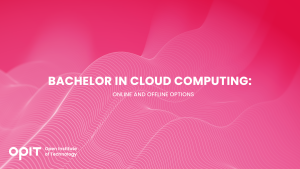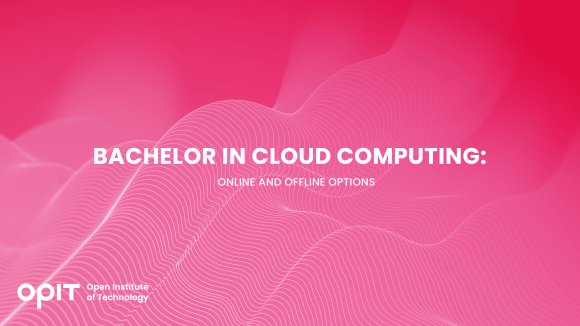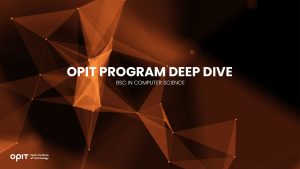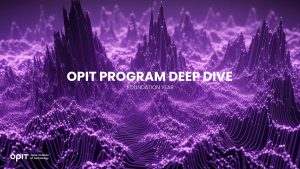

Cloud computing has quickly become one of the fastest-growing industries. The U.S. Bureau of Labor Statistics estimates that the demand for roles in the industry will grow much faster than the average for all occupations. This means that students today will likely be able to find a career in cloud computing much faster than usual. To further illustrate the point, Indeed currently lists more than 8,000 job openings for cloud computing roles.
Despite that, many companies are seeking only top talent, which quickly reduces the available options and drives up demands (as well as salaries). If you want to get a lucrative job in the industry, you must have the appropriate skillset to match.
However, a general background in IT may no longer be enough. A dedicated cloud computing bachelor degree will provide you with the exact abilities you need to excel in these roles and will allow you to upskill to senior positions quickly.
Why Choose a Bachelor in Cloud Computing?
One of the most common misconceptions about programming jobs—and, by extension, cloud computing—is that you don’t need a degree to land a job.
While you can technically get a job in IT without a degree and go from there, the path to success through independent learning is often rocky. You may need to spend multiple years honing your skills through non-accredited courses and self-learning videos. Even if you do manage to get a role close to cloud computing, you may have a more difficult time acclimating to specific job requirements, and your progression may be limited without a degree.
On the other hand, a bachelor’s degree in IT or computer science provides an excellent foundational background. While you might not use all the theoretical knowledge you learn, finishing a bachelor’s degree gives you a broad range of expertise you can leverage to zero in on a desired career path. Specifically, for a bachelor in cloud computing, the focus is on learning different programming languages and coding practices to allow you to adapt to any platform you may need to use during your future job.
Furthermore, completing a bachelor’s shows that you have persistence and can apply theory to practice in exams and project work as part of your degree.
Additionally, many institutions that offer a bachelor’s degree in cloud computing also have close connections with nearby companies that require these positions to grow. They can provide internships to promising students even before they finish their studies and keep them on as permanent team members afterward.
Understanding the Curriculum of a Cloud Computing Bachelor Degree
Cloud computing is an extensive term that encompasses pretty much every application that accesses remote servers over the internet. As a result, there have been many implementations of the concept, and several programming languages were developed to leverage it.
A Bachelor of Science cloud computing degree (or computer science in general) will often have multiple courses dedicated to learning programming languages at the start. Later, the curriculum moves to dedicated courses that translate those basics into tangible skills and projects.
In general, here’s what you will need to learn:
- Algebra and advanced mathematics
- Technical English
- Computer architecture (hardware)
- Programming principles
- Programming languages (C, C++, C#, Java, Node.js and Javascript, Python, Ruby, Golang, etc.)
- Algorithms and data management
- Database concepts and management
- Networking concepts
- Application development
- Web development
Additionally, you will likely have courses on machine learning and AI, given how the industry has bloomed around them in the past few years.
Generally, the curriculum for any given bachelor in cloud computing will include theoretical classes first. Later sections or courses will focus more on implementing these concepts in practice.
Alternatively, you can also have courses that more heavily focus on application, such as a bachelor’s degree from OPIT. It covers the theoretical parts as necessary to apply them while students follow practice work and develop projects.
The Best Offline and Online Bachelors in Cloud Computing
Here are some of the best courses and universities you can attend to get a cloud computing bachelor degree.
1. OPIT – Bachelor’s Degree (BSc) in Modern Computer Science
OPIT is one of the leading European higher education institutions that solely focuses on online learning. Due to a more modern design compared to a traditional university, OPIT fully utilizes the benefits of online learning to support students through an array of both theoretical and practical courses.
The bachelor’s degree lasts for six terms and teaches all aspects of computer science, but students can pick elective courses that zero in on cloud computing in later terms. These include cloud architecture, data stacks, cybersecurity in the cloud, and digitalization protocols for converting traditional applications to the cloud. The bachelor’s courses also include an introduction to business management, allowing students to delve into entrepreneurship and become future leaders.
2. Purdue University Global – Bachelor of Science in Cloud Computing and Solutions
Purdue is a U.S.-based university that provides an online four-year bachelor’s degree course. As a degree fully focused on cloud computing, it foregoes most of the basics of computer science. Students learn by following online lessons and applying the theory to practical projects and lab work. Additionally, the program includes project management practices that help students migrate into senior roles.
3. WGU – Cloud Computing Bachelor’s Program
WGU makes its offer extremely lucrative by focusing on some of the most popular cloud computing platforms: Amazon, Azure, and AWS. The program is designed to be completed within three years, with online learning allowing students to accelerate their progress as much as they want. Furthermore, the degree contains over 16 different certificates as part of its curriculum, allowing students to fill in their resumes even before they finish the degree.
4. University of Liverpool – Computer Science With Software Development With a Year in Industry – Offline Degree
The University of Liverpool is one of the top British universities, ranked around 150th in the world. Its computer science degree focuses on teaching theoretical knowledge in the first year, applying that to lab work in the second, and developing projects in the fourth. The third year is dedicated to working in a software development company that works closely with the university. This presents a unique opportunity for students to apply what they learn and develop their skills in real-life scenarios.
5. Morgan State University – Bachelor of Science in Cloud Computing
MSU is a U.S.-based university in Maryland, but it offers a bachelor’s degree in cloud computing as a fully online course. The program is designed for people who are already in the workforce and need a degree to upskill and progress through their careers. It focuses on modern aspects of cloud-based engineering and architecture. The degree lasts three years but contains slightly more general-purpose classes than dedicated courses.
The Online Advantage: Earning Your Bachelor Degree in Cloud Computing Remotely
The advent of online learning has broken traditional barriers to achieving higher education. Since you no longer have to relocate, the price of studying for a bachelor’s goes down dramatically. Furthermore, online classes typically have portions of the coursework as pre-recorded asynchronous lessons. This can be a great option for people with full-time jobs who can’t attend live lessons frequently.
OPIT provides a thorough support system for online students, with regular assessment sessions and thorough career and study advisory.
Career Outcomes With a Bachelor of Science in Cloud Computing
Cloud computing is one of the fastest-growing industries in the world. Most experts in cloud computing have developer or management positions that design and implement applications. Some of the most common positions in the industry include:
- Cloud architect
- Cloud network engineer
- DevOps engineer
- Cloud database administrator
Regardless of the role, cloud computing is a lucrative career and attracts a high salary.
Industry Certifications and Your Bachelor in Cloud Computing
Certifications are perhaps even more important than just having a bachelor’s degree. They are structured tests that showcase that you have the knowledge and practical aptitude for a platform or programming language. Many bachelor’s degrees in cloud computing, including OPIT, will directly provide students with the knowledge necessary to obtain these certifications, and some have the certifications built into the program.
Financial Investment and ROI of a Bachelor Degree in Cloud Computing
Apart from being an exciting career opportunity in terms of growth, the salaries of cloud engineers are also lucrative. A cloud engineer in Germany typically earns around €65k per year. However, salaries in the U.S. can frequently reach six figures.
So, don’t be put off by the high admission fees for cloud computing bachelor’s degrees. Consider it an investment into a comfortable future. OPIT’s bachelor’s degrees ensure access to higher education by keeping admissions low and providing scholarships.
Start Your Career in Cloud Computing With a Bachelor’s From OPIT
By getting a modern degree in cloud computing, you can get skills that will be relevant in the coming decades as the world increasingly turns to web-based applications. OPIT’s bachelor’s degree in modern computer science will provide you with the breadth of knowledge necessary to progress to leadership positions and ensure an excellent career. Go to OPIT’s course page to find out more and enroll today.
Related posts

Computer Science is fast becoming one of the most valuable fields of study, with high levels of demand and high-salaried career opportunities for successful graduates. If you’re looking for a flexible and rewarding way to hone your computing skills as part of a supportive global community, the BSc in Computer Science at the Open Institute of Technology (OPIT) could be the perfect next step.
Introducing the OPIT BSc in Computer Science
The OPIT BSc in Computer Science is a bachelor’s degree program that provides students with a comprehensive level of both theoretical and practical knowledge of all core areas of computer science. That includes the likes of programming, databases, cloud computing, software development, and artificial intelligence.
Like other programs at OPIT, the Computer Science BSc is delivered exclusively online, with a mixture of recorded and live content for students to engage with. Participants will enjoy the instruction of world-leading lecturers and professors from various fields, including software engineers at major tech brands and esteemed researchers, and will have many paths open to them upon graduation.
Graduates may, for example, seek to push on with their educational journeys, progressing on to a specialized master’s degree at OPIT, like the MSc in Digital Business and Innovation or the MSc in Responsible Artificial Intelligence. Or they could enter the working world in roles like software engineer, data scientist, web developer, app developer, or cybersecurity consultant.
The bullets below outline the key characteristics of this particular course:
- Duration: Three years in total, spread across six terms.
- Content: Core courses for the first four terms, a student-selected specialization for the fifth term, and a capstone project in the final term.
- Focus: Developing detailed theoretical knowledge and practical skills across all core areas of modern computer science.
- Format: Entirely online, with a mixture of live lessons and asynchronous content you can access 24/7 to learn at your own pace.
- Assessment: Progressive assessments over the course of the program, along with a capstone project and dissertation, but no final exams.
What You’ll Learn
Students enrolled in the BSc in Computer Science course at OPIT will enjoy comprehensive instruction in the increasingly diverse sectors that fall under the umbrella of computer science today. That includes a close look at emerging technologies, like AI and machine learning, as well as introductions to the fundamental skills involved in designing and developing pieces of software.
The first four terms are the same for all students. These will include introductions to software engineering, computer security, and cloud computing infrastructure, as well as courses focusing on the core skills that computer scientists invariably need in their careers, like project management, quality assurance, and technical English.
For the fifth term, students will have a choice. They can select five electives from a pool of 27, or select one field to specialize in from a group of five. You may choose to specialize in all things cybersecurity, for example, and learn about emerging cyber threats. Or you could focus more on specific elements of computer science that appeal to your interests and passions, such as game development.
Who It’s For
The BSc in Computer Science program can suit a whole range of prospective applicants and should appeal to anyone with an interest or passion for computing and a desire to pursue a professional career in this field. Whether you’re seeking to enter the world of software development, user experience design, data science, or another related sector, this is the course to consider.
In addition, thanks to OPIT’s engaging, flexible, and exclusively online teaching and learning systems, this course can appeal to people from all over the globe, of different ages, and from different walks of life. It’s equally suitable for recent high school graduates with dreams of making their own apps to seasoned professionals looking to broaden their knowledge or transition to a different career.
The Value of the BSc in Computer Science Course at OPIT
Plenty of universities and higher education establishments around the world offer degrees in computer science, but OPIT’s program stands out for several distinctive reasons.
Firstly, as previously touched upon, all OPIT courses are delivered online. Students have a schedule of live lessons to attend, but can also access recorded content and digital learning resources as and when they choose. This offers an unparalleled level of freedom and flexibility compared to more conventional educational institutions, putting students in the driving seat and letting them learn at their own pace.
OPIT also aims not merely to impart knowledge through lectures and teaching, but to actually help students gain the practical skills they need to take the next logical steps in their education or career. In other words, studying at OPIT isn’t simply about memorizing facts and paragraphs of text; it’s about learning how to apply the knowledge you gain in real-world settings.
OPIT students also enjoy the unique benefits of a global community of like-minded students and world-leading professors. Here, distance is no barrier, and while students and teachers may come from completely different corners of the globe, all are made to feel welcome and heard. Students can reach out to their lecturers when they feel the need for guidance, answers, and advice.
Other benefits of studying with OPIT include:
- Networking opportunities and events, like career fairs, where you can meet and speak with representatives from some of the world’s biggest tech brands
- Consistent support systems from start to finish of your educational journey in the form of mentorships and more
- Helpful tools to expedite your education, like the OPIT AI Copilot, which provides personalized study support
Entry Requirements and Fees
To enroll in the OPIT BSc in Computer Science and take your next steps towards a thrilling and fulfilling career in this field, you’ll need to meet some simple criteria. Unlike other educational institutions, which can impose strict and seemingly unattainable requirements on their applicants, OPIT aims to make tech education more accessible. As a result, aspiring students will require:
- A higher secondary school leaving certificate at EQF Level 4, or equivalent
- B2-level English proficiency, or higher
Naturally, applicants should also have a passion for computer science and a willingness to study, learn, and make the most of the resources, community, and support systems provided by the institute.
In addition, if you happen to have relevant work experience or educational achievements, you may be able to use these to skip certain modules or even entire terms and obtain your degree sooner. OPIT offers a comprehensive credit transfer program, which you can learn more about during the application process.
Regarding fees, OPIT also stands out from the crowd compared to conventional educational institutions, offering affordable rates to make higher tech education more accessible. There are early bird discounts, scholarship opportunities, and even the option to pay either on a term-by-term basis or a one-off up-front fee.

The Open Institute of Technology (OPIT) provides a curated collection of courses for students at every stage of their learning journey, including those who are just starting. For aspiring tech leaders and those who don’t quite feel ready to dive directly into a bachelor’s degree, there’s the OPIT Foundation Program. It’s the perfect starting point to gain core skills, boost confidence, and build a solid base for success.
Introducing the OPIT Foundation Year Program
As the name implies, OPIT’s Foundation Program is about foundation-level knowledge and skills. It’s the only pre-bachelor program in the OPIT lineup, and successful students on this 60-ECTS credit course will obtain a Pre-Tertiary Certificate in Information Technology upon its completion. From there, they can move on to higher levels of learning, like a Bachelor’s in Digital Business or Modern Computer Science.
In other words, the Foundation Program provides a gentle welcome into the world of higher technological education, while also serving as a springboard to help students achieve their long-term goals. By mixing both guided learning and independent study, it also prepares students for the EQF Level 4 experiences and challenges they’ll face once they enroll in a bachelor’s program in IT or a related field.
Here’s a quick breakdown of what the OPIT Foundation Program course involves:
- Duration: Six months, split into two terms, with each term lasting 13 weeks
- Content: Three courses per term, with each one worth 10 ECTS credits, for a total of 60
- Focus: Core skills, like mathematics, English, and introductory-level computing
- Format: Video lectures, independent learning, live sessions, and digital resources (e-books, etc.)
- Assessment: Two to three assessments over the course of the program
What You’ll Learn
The OPIT Foundation Program doesn’t intensely focus on any one particular topic, nor does it thrust onto you the more advanced, complicated aspects of technological education you would find in a bachelor’s or master’s program. Instead, it largely keeps things simple, focusing on the basic building blocks of knowledge and core skills so that students feel comfortable taking the next steps in their studies.
It includes the following courses, spread out across two terms:
- Academic Skills
- Mathematics Literacy I
- Mathematics Literacy II
- Internet and Digital Technology
- Academic Reading, Writing, and Communication
- Introduction to Computer Hardware and Software
Encompassing foundational-level lessons in digital business, computer science, and computer literacy, the Foundation Program produces graduates with a commanding knowledge of common operating systems. Exploring reading and writing, it also helps students master the art of communicating their ideas and responses in clear, academic English.
Who It’s For
The Foundation Year program is for people who are eager to enter the world of technology and eventually pursue a bachelor’s or higher level of education in this field, but feel they need more preparation. It’s for the people who want to work on their core skills and knowledge before progressing to more advanced topics, so that they don’t feel lost or left behind later on.
It can appeal to anyone with a high school-level education and ambitions of pushing themselves further, and to anyone who wants to work in fields like computer science, digital business, and artificial intelligence (AI). You don’t need extensive experience or qualifications to get started (more on that below); just a passion for tech and the motivation to learn.
The Value of the Foundation Program
With technology playing an increasingly integral role in the world today, millions of students want to develop their tech knowledge and skills. The problem is that technology-oriented degree courses can sometimes feel a little too complex or even inaccessible, especially for those who may not have had the most conventional educational journeys in the past.
While so many colleges and universities around the world simply expect students to show up with the relevant skills and knowledge to dive right into degree programs, OPIT understands that some students need a helping hand. That’s where the Foundation Program comes in – it’s the kind of course you won’t find at a typical university, aimed at bridging the gap between high school and higher education.
By progressing through the Foundation Program, students gain not just knowledge, but confidence. The entire course is aimed at eliminating uncertainty and unease. It imbues students with the skills and understanding they need to push onward, to believe in themselves, and to get more value from wherever their education takes them next.
On its own, this course won’t necessarily provide the qualifications you need to move straight into the job market, but it’s a vital stepping stone towards a degree. It also provides numerous other advantages that are unique to the OPIT community:
- Online Learning: Enjoy the benefits of being able to learn at your own pace, from the comfort of home, without the costs and inconveniences associated with relocation, commuting, and so on.
- Strong Support System: OPIT professors regularly check in with students and are on hand around the clock to answer queries and provide guidance.
- Academic Leaders: The OPIT faculty is made up of some of the world’s sharpest minds, including tech company heads, experienced researchers, and even former education ministers.
Entry Requirements and Fees
Unlike OPIT’s other, more advanced courses, the Foundation Program is aimed at beginners, so it does not have particularly strict or complex entry requirements. It’s designed to be as accessible as possible, so that almost anyone can acquire the skills they need to pursue education and a career in technology. The main thing you’ll need is a desire to learn and improve your skills, but applicants should also possess:
- English proficiency at level B2 or higher
- A Secondary School Leaving Certificate, or equivalent
Regarding the fees, OPIT strives to lower the financial barrier of education that can be such a deterrent in conventional education around the world. The institute’s tuition fees are fairly and competitively priced, all-inclusive (without any hidden charges to worry about), and accessible for those working with different budgets.
Given that all resources and instruction are provided online, you can also save a lot of money on relocation and living costs when you study with OPIT. In addition, applicants have the option to pay either up front, with a 10% discount on the total, or on a per-term basis, allowing you to stretch the cost out over a longer period to ease the financial burden.
Have questions?
Visit our FAQ page or get in touch with us!
Write us at +39 335 576 0263
Get in touch at hello@opit.com
Talk to one of our Study Advisors
We are international
We can speak in:


